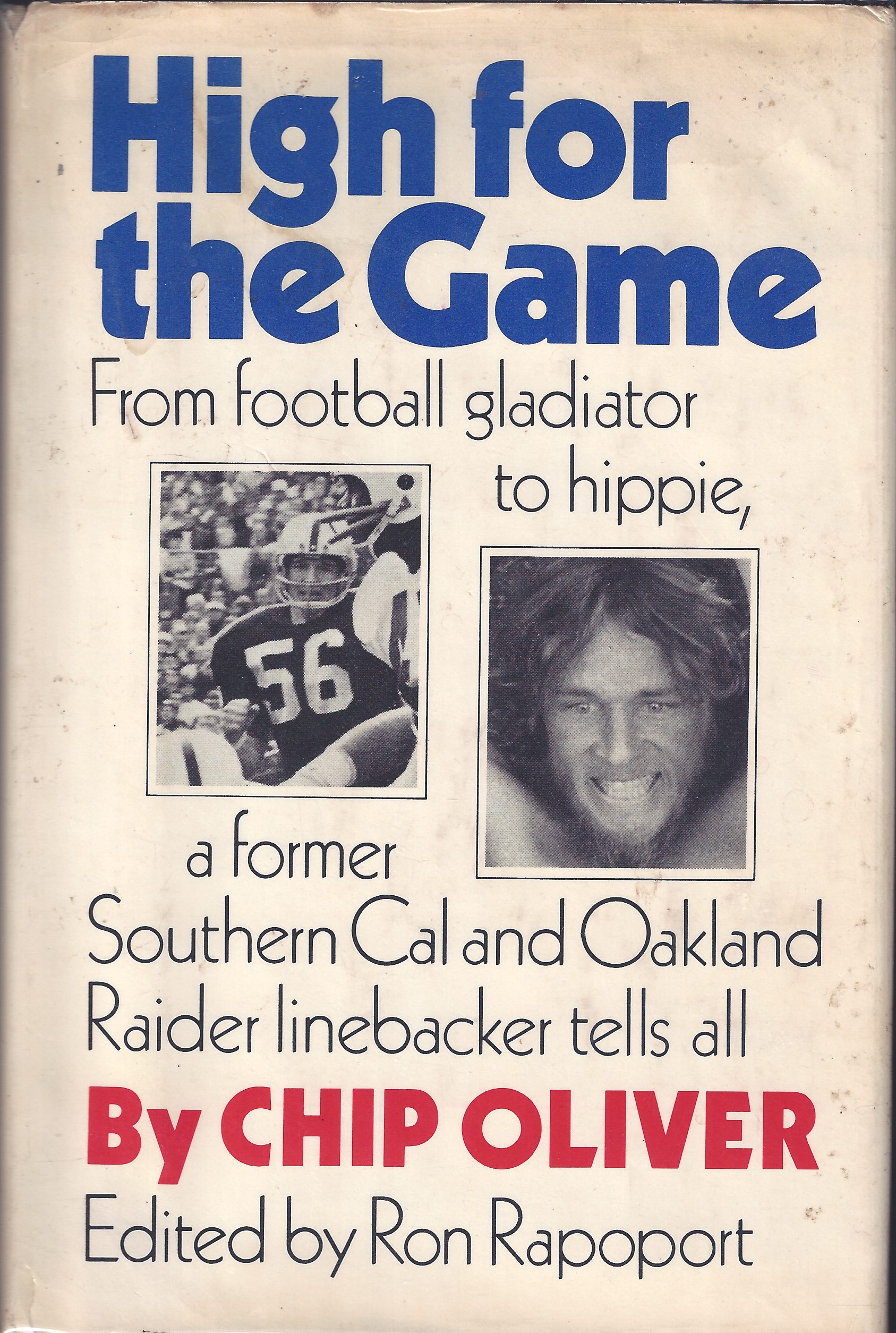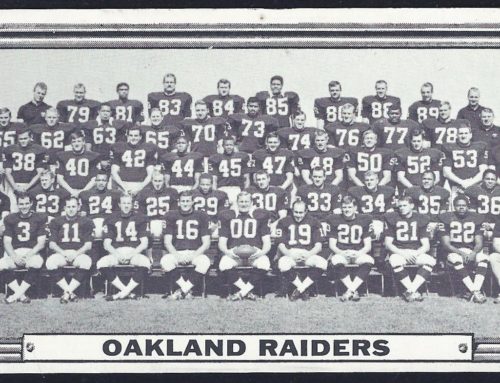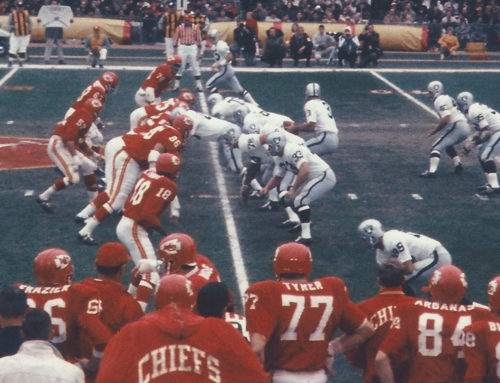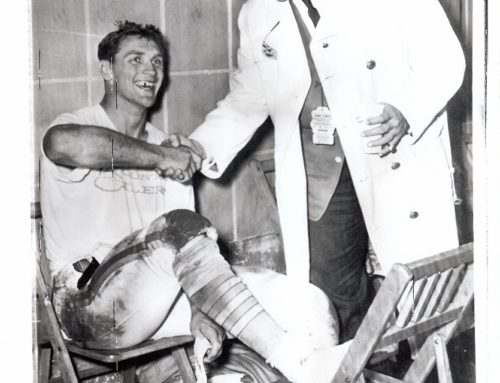A few weeks ago I posted about a Sports Illustrated article that featured former Raiders linebacker-turned-hippie, Chip Oliver. The article caused me to revisit Oliver’s autobiography, High for the Game, which he co-authored with Ron Rapoport in 1971.
The son on an Army sergeant, Ralph “Chip” Oliver bounced around some while growing up, before settling in at Hoover High School in San Diego. His route to professional football was rather unconventional, as he got married and spent time in Las Vegas after high school, but soon divorced and came back to San Diego City College. He then made his way to USC before joining the Oakland Raiders as an 11th round draft choice in 1968. Oliver had a two-season professional career, averaging five tackles-per-game from his linebacker position and scoring one touchdown on an interception. However, the life of a professional football player never really appealed to Oliver, and he quit the Raiders after the 1969 season. From there he became a vegetarian (which were his tendencies already during the 1969 football season), swore off material possessions, joined a commune, and started working in a natural foods store.
Reading High for the Game is an interesting experience in that much of what Oliver says about the AFL/NFL has actually come to light over the last few years in regards to the long-term physical damage that has haunted many players since their retirement from the game. In a no-holds-barred style, Oliver blasts professional football for treating players as pieces of meat, pumping them full of pain-numbing drugs and amphetamines, and then discarding them like common garbage when they can no longer sustain high levels of play on the field. In a way, Oliver was ahead of his time in his beliefs, and willingness to vocalize them. However…
Chip Oliver was also a full-blown hippie, which immediately contrasts with the seemingly All-American standard of the 1960s professional football player. He loses vast amounts of credibility when he describes attending practices high on mescaline, advocates the use of LSD, and talks about smoking enormous amounts of marijuana. He also gives his thoughts on the political scene of the day, and offers his views for “solving” the issues that plagued our country at the time.
Frankly, I found the book interesting. As someone who was born in 1972, I enjoyed reading Oliver’s points of view, if only so that I could better-understand the mindset that was so prevalent among people during the era. Oliver’s inside stories of one of the AFL’s greatest teams were also interesting, though most of his stories were used to illustrate his own opinions rather than to adequately document the team. However, it is clear that he had an axe to grind at the time of writing, and his arguments seem comical, as least when viewed through contemporary eyes.





I have this book. I was at the 1969 Raider/Charger played at San Diego Stadium. Before the game as the Raider players were leaving the field to enter the tunnel after warm-ups Chip Oliver smiled at me and gave me the peace sign.
http://www.dvdizzy.com/allinthefamily-completeseries2.html
Scroll to middle of page
Chip auditioning for the son-in-law role in “All in the Family ….
I have not read this book. Would love to. Gotta search for a copy. Thanks Todd.
Hey Mark, I was JUST talking about your league a couple hours ago. On this very site–on the article titled “The Packers may have won Super Bowl I…” (December 10th, 2013)–I comment that Ken Bowman loved his time playing for Hawaii in 1975.
I am still highly interested in your book on the 1974 Florida Blazers. I e-mailed you about it almost a couple years ago (early 2012), and I want to contact you again. I’m sure I still have your address, but I thought I’d say something now.
Your book covers an era of football that came right after the era Chip Oliver writes about. Fascinating times, no doubt.
Enjoyed the article, Todd, but I fail to see how Oliver “loses vast amounts of credibility when he describes attending practices high on mescaline, advocates the use of LSD, and talks about smoking enormous amounts of marijuana.” You may not approve of Oliver’s admitted drug use (I know I don’t), but whether he used or did not use drugs has nothing to do with his credibility unless there are individuals who can prove that Oliver’s statements of fact (not opinion) are not true. In the absence of that, we can all agree that Oliver was a free spirit with the physical skills and ability to play professional football.
Michael Rivo
San Diego, CA
Interesting. I may not have properly expressed myself. My meaning was that at least to me, Oliver loses credibility with his statements regarding personnel, health, etc. of the Raiders because most of his observations were made while under the influence of mind-altering drugs. People can use or not use as they choose, but i brlieve that their observations while under those drugs should be accepted with a grain of salt.
… [Trackback]
[…] Find More to that Topic: talesfromtheamericanfootballleague.com/linebacker-turned-hippie-high-for-the-game-a-book-review/ […]
… [Trackback]
[…] Find More to that Topic: talesfromtheamericanfootballleague.com/linebacker-turned-hippie-high-for-the-game-a-book-review/ […]
… [Trackback]
[…] Find More Information here to that Topic: talesfromtheamericanfootballleague.com/linebacker-turned-hippie-high-for-the-game-a-book-review/ […]
… [Trackback]
[…] Information to that Topic: talesfromtheamericanfootballleague.com/linebacker-turned-hippie-high-for-the-game-a-book-review/ […]
… [Trackback]
[…] Read More Information here on that Topic: talesfromtheamericanfootballleague.com/linebacker-turned-hippie-high-for-the-game-a-book-review/ […]
… [Trackback]
[…] Find More on to that Topic: talesfromtheamericanfootballleague.com/linebacker-turned-hippie-high-for-the-game-a-book-review/ […]
… [Trackback]
[…] Here you will find 39577 additional Information to that Topic: talesfromtheamericanfootballleague.com/linebacker-turned-hippie-high-for-the-game-a-book-review/ […]
… [Trackback]
[…] Information on that Topic: talesfromtheamericanfootballleague.com/linebacker-turned-hippie-high-for-the-game-a-book-review/ […]
… [Trackback]
[…] Find More here to that Topic: talesfromtheamericanfootballleague.com/linebacker-turned-hippie-high-for-the-game-a-book-review/ […]
… [Trackback]
[…] Find More Information here on that Topic: talesfromtheamericanfootballleague.com/linebacker-turned-hippie-high-for-the-game-a-book-review/ […]
… [Trackback]
[…] Read More to that Topic: talesfromtheamericanfootballleague.com/linebacker-turned-hippie-high-for-the-game-a-book-review/ […]
… [Trackback]
[…] Find More here to that Topic: talesfromtheamericanfootballleague.com/linebacker-turned-hippie-high-for-the-game-a-book-review/ […]
… [Trackback]
[…] Here you will find 77775 additional Information on that Topic: talesfromtheamericanfootballleague.com/linebacker-turned-hippie-high-for-the-game-a-book-review/ […]
… [Trackback]
[…] Read More on on that Topic: talesfromtheamericanfootballleague.com/linebacker-turned-hippie-high-for-the-game-a-book-review/ […]
… [Trackback]
[…] Info on that Topic: talesfromtheamericanfootballleague.com/linebacker-turned-hippie-high-for-the-game-a-book-review/ […]
… [Trackback]
[…] Find More to that Topic: talesfromtheamericanfootballleague.com/linebacker-turned-hippie-high-for-the-game-a-book-review/ […]
… [Trackback]
[…] Read More on that Topic: talesfromtheamericanfootballleague.com/linebacker-turned-hippie-high-for-the-game-a-book-review/ […]
… [Trackback]
[…] Read More on on that Topic: talesfromtheamericanfootballleague.com/linebacker-turned-hippie-high-for-the-game-a-book-review/ […]
… [Trackback]
[…] Information to that Topic: talesfromtheamericanfootballleague.com/linebacker-turned-hippie-high-for-the-game-a-book-review/ […]
… [Trackback]
[…] Read More to that Topic: talesfromtheamericanfootballleague.com/linebacker-turned-hippie-high-for-the-game-a-book-review/ […]
… [Trackback]
[…] Read More to that Topic: talesfromtheamericanfootballleague.com/linebacker-turned-hippie-high-for-the-game-a-book-review/ […]
… [Trackback]
[…] Read More Info here to that Topic: talesfromtheamericanfootballleague.com/linebacker-turned-hippie-high-for-the-game-a-book-review/ […]
… [Trackback]
[…] Read More Information here to that Topic: talesfromtheamericanfootballleague.com/linebacker-turned-hippie-high-for-the-game-a-book-review/ […]
… [Trackback]
[…] Info to that Topic: talesfromtheamericanfootballleague.com/linebacker-turned-hippie-high-for-the-game-a-book-review/ […]
… [Trackback]
[…] Find More to that Topic: talesfromtheamericanfootballleague.com/linebacker-turned-hippie-high-for-the-game-a-book-review/ […]
… [Trackback]
[…] Read More on that Topic: talesfromtheamericanfootballleague.com/linebacker-turned-hippie-high-for-the-game-a-book-review/ […]
… [Trackback]
[…] Read More here to that Topic: talesfromtheamericanfootballleague.com/linebacker-turned-hippie-high-for-the-game-a-book-review/ […]
… [Trackback]
[…] Read More on on that Topic: talesfromtheamericanfootballleague.com/linebacker-turned-hippie-high-for-the-game-a-book-review/ […]
… [Trackback]
[…] Read More on to that Topic: talesfromtheamericanfootballleague.com/linebacker-turned-hippie-high-for-the-game-a-book-review/ […]
… [Trackback]
[…] Read More to that Topic: talesfromtheamericanfootballleague.com/linebacker-turned-hippie-high-for-the-game-a-book-review/ […]